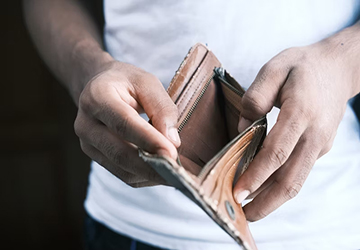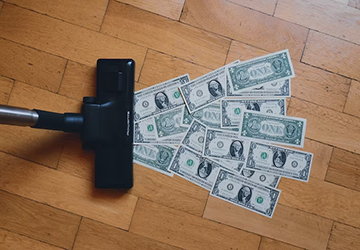Are you feeling weighed down by the never-ending cycle of debt? Are your financial goals constantly taking a back seat due to loan payments and interest rates?
Don't panic; you're not alone, and there are practical steps you can take to rescue yourself from debt.
Imagine living a life free of debt, where decisions about your finances are influenced by your goals rather than those of your creditors. This life awaits you as you work toward debt-free; it may seem difficult, but it is completely doable.
In this article, we will explore seven effective strategies that can assist you in repaying your debts and put you on the road to financial empowerment and stability.
Debt holds you back as you try to sail over the wide-open waters of financial independence, much like an anchor. Multiple loans and credit card amounts can be too much to bear, which can cause stress, insomnia, and lost opportunities.
Face your debt head-on as the first step to escaping its clutches. Make a list of every debt you have, including credit card debt, mortgages, personal loans, student loans, and any other outstanding loans. Include information about the interest rates, required minimum payments, and overall sums outstanding. Your debt payback strategy will be built using this detailed picture of your financial status.

A budget is a tool that gives you the power to take charge of your finances; it's not a constraint. Consider it your financial GPS, directing you to your preferred destination of debt independence and financial stability.
Start by classifying your costs into two primary groups: necessary and optional. Housing, utilities, groceries, transportation, and the bare minimum in debt payments are all essential expenses. Entertainment, eating out, shopping, and other luxuries are discretionary expenses.
Set up a separate category in your spending plan for paying off debt. Giving this group a sizable amount of your money will hasten the process of paying off your debt.
Look over your discretionary spending and pinpoint places where you may make savings. Increase your home cooking frequency, cancel unused subscriptions, and look for free or inexpensive entertainment options. Every dollar you save can go toward paying off debt.
Debts are not all created equal. Due to their higher interest rates, certain loans, known as high-interest debts, can harm your financial situation. Payday loans and credit card balances are two examples of this debt.
The "avalanche method" is one efficient way to pay off high-interest debt. This method entails making minimal payments on all other obligations while paying off the debt with the highest interest rate first. After paying off the highest, you go on to the next highest-interest obligation, starting a snowball effect that speeds up your debt payback process.
Debt consolidation entails consolidating various loans or credit lines with higher interest rates into one with a reduced interest rate. This can make managing your finances easier by lowering the amount of payments you have each month.
Personal loans, balance transfer credit cards, and home equity loans are further options for debt consolidation. It's important to carefully consider which option best fits your financial circumstances and aspirations because each has advantages and disadvantages.
The benefits of debt consolidation include the potential to pay off your debt sooner, simpler payments, and a reduced overall interest rate. But it's important to read the small print, comprehend any added costs, and ensure you will avoid getting into greater financial straits.
Consider rolling a snowball down a hill; as it descends, it gains momentum and enlarges—the debt payback strategy known as the snowball works similarly.
Beginning with the smallest debt, pay it off while continuing to only make the minimum payments on the higher debts. Your satisfaction as you pay off each minor debt motivates you to take on bigger ones.
The snowball method takes into account psychology as well as math. Regardless of the size of the debt, the satisfaction of paying it off in full can increase your drive and dedication to your debt-free goal.

Budgeting and cost-cutting are crucial to managing your finances, but bringing in more money can significantly speed up paying off debt.
Investigate side business opportunities that fit your schedule, hobbies, and talents. Freelance work, consulting, selling handcrafted goods online, tutoring, and offering services like graphic design or writing are all side businesses.
Spend time honing your abilities to increase the profitability of your side business. Consider enrolling in online classes or workshops to improve your skills and increase your earning potential.
Directly allocating your side hustle money to debt repayment is vital to use wisely. Establish a separate account to monitor this money and ensure it helps you reach your financial objectives.
It can be not easy to navigate the complex world of personal finance, particularly when juggling several obligations and financial objectives.
If you're feeling overwhelmed by your financial circumstances or uncertain about the best ways to meet your debt repayment goals, consider obtaining the advice of a professional financial planner or advisor.
Financial consultants can offer tailored advice based on your particular situation, assisting you in developing a complete strategy that considers your debt, savings, investments, and long-term financial objectives.
Keep your focus on the goal as you proceed along this path: being free of debt. Each payment you make, and each hardship you undergo moves you one step closer to the emancipation you want.
Take pride in every dollar you put into debt repayment because it represents more than just money; it represents your will to retake control over your finances. It's evidence of your tenacity and drive to create a better financial future for you.
Despite the road's detours, each stride taken forward moves one step farther away from the responsibilities of the past. Imagine the opportunities ahead of you—a life where your financial situation is your own, and your dreams are no longer constrained by debt.
So, stand firm in your determination with the tactics described in this tutorial. Accept the difficulties because they will help you to financial freedom. The objective is to rewrite your financial narrative and create a triumphant tale, not only to pay off debts.
Remember that the journey itself is a success as you press on. Celebrate each accomplishment, no matter how minor, and be motivated by your growth. You hold the power to change your financial future; grasp it, accept it, and set yourself free.